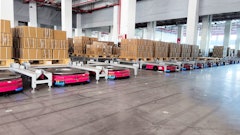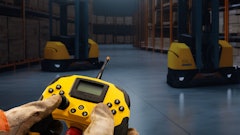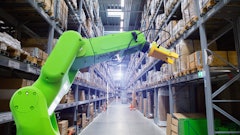
Voice picking has moved into the mainstream. Increasingly regarded as a best practice for warehousing operations that require manual handling tasks during order fulfillment, voice picking produces strong return on investment (ROI) that is now widely documented across multiple industries. Logistics executives plan voice picking deployments because they are among the few initiatives that pay back capital outlays in less than 12 months — and in today's economic climate, these are the projects that get approved first.
While getting full payback in 12 months is a very good thing, it is also a short-term result. Too often, enterprises focus on the classic benefits of voice picking that quickly accrue — increased productivity, greater accuracy and improved workplace safety — but ignore the important issues that make for truly long-term ROI.
Warehouses are dynamic centers of commercial activity that figure prominently into enterprise business strategy. Top-flight warehouse managers are constantly thinking about business processes, continuously refining those processes to improve customer service or reduce cost. Change is the real constant in these operations — and inflexible systems are the enemy. Highly customized, proprietary voice systems may provide substantial short-term ROI, but ultimately they are not engineered for change, and long-term ROI is impacted as a result.
Ensuring long-term ROI from voice technology revolves around three interrelated issues: change, choice and control. When executives expand the planning horizon to encompass these "3 Cs," then new evaluation criteria for voice picking technology emerge.
As savvy logistics executives evaluate a new technology, after asking, "What's the benefit?", they follow up quickly with, "How could I get locked in?" They know that even great short-term benefits are just not worth the price of being locked in and unable to react when change becomes a necessity. Because voice providers vary in their capacity to meet customer demands for change, choice and control, it is important for logistics executives to ask questions in a number of key areas when evaluating voice solutions and the ROI they provide over time:
Client hardware — How easy is it to refresh hardware devices, even if we decide to switch manufacturers? Will our existing voice applications still operate without any coding changes? What are the steps and cost involved in making such a move?
Business processes — What has to happen when we want to change what order selectors do? For example, we may need to support some new government regulation or handling requirement. Is programming involved? Will we get sticker shock when we see the services engagement price tag? How long will we have to wait?
WMS interface — What kind of changes are possible without opening the WMS code? How do we keep the voice system in sync with the WMS? Can we evolve them independently of each other, or is there a "deadly embrace" that we have to worry about?
IT infrastructure — Can the voice system fit within our preferred IT technology stack, and how does it keep up with changes to key infrastructure systems, such as new releases of OS or database managers? Can we deploy to remote DCs but later decide to manage the operation centrally from our corporate data center without changing the voice picking application code?
Logistics executives put a premium on the power of choice because having the flexibility to choose between alternatives is a strategic way to keep costs low. Voice picking solutions operate in lockstep with the front-line workforce, but they must integrate seamlessly into a changing operation and a technology backbone that includes other systems. Warehouses quickly come to rely on voice picking and cannot afford to return to the practices of the past. When the voice solution is rigid, proprietary and closed — then choice is severely limited, and the ability to respond to change is compromised.
Nobody can predict the future with 100 percent accuracy, but enterprises with a long-term outlook are better able to control their futures than peer organizations. They plan for change in advance, even before those changes are known. The payoff is lower cost over the long haul, as well as higher competitive advantage.
Voice picking solutions return short-term benefits because workers quickly become more proficient than ever before. But getting the best long-term ROI depends upon how well the solutions support change, choice and control.
Related Article
- Voice in a Multicultural DC/Warehouse — A sound solution for building productivity and performance















![Pros To Know 2026 [color]](https://img.sdcexec.com/mindful/acbm/workspaces/default/uploads/2025/08/prostoknow-2026-color.mduFvhpgMk.png?ar=16%3A9&auto=format%2Ccompress&bg=fff&fill-color=fff&fit=fill&h=135&q=70&w=240)



